- Supercool
- Posts
- 🌐 Trove Turns Recommerce into a Profit Driver for Patagonia, Levi’s and On
🌐 Trove Turns Recommerce into a Profit Driver for Patagonia, Levi’s and On
Resale is cutting carbon and boosting profits for billion-dollar fashion and apparel brands.
The “Fight Club” of Circularity
When Terry Boyle took the CEO role at Trove, he brought a fresh perspective on the recommerce company’s mission.
“I kind of joke with my team,” he says. “It’s sort of like Fight Club. We have this environmental mission, but we never talk about it. We’re always trying to sell on the basis of the economics for the brands and retailers.”
Terry doesn’t come from the sustainability movement. He’s an e-commerce executive who’s led some of the largest shopping sites on the web: Nordstromrack.com, Zulily, Trunk Club.
“The original founders were the visionaries,” Terry says. “I kind of consider myself the commercializer. My goal is to work with brands one-to-one and show them how great this is for their business.”
Trove’s mission—less waste, more reuse, a circular economy—clicked for Terry, but the business opportunity brought him on board.
In Trove, he saw a platform that could scale globally, helping big, beloved brands drive growth, margin, and operational efficiency.
For brands, resale isn’t a feel-good project. Done right, it’s a profit center.
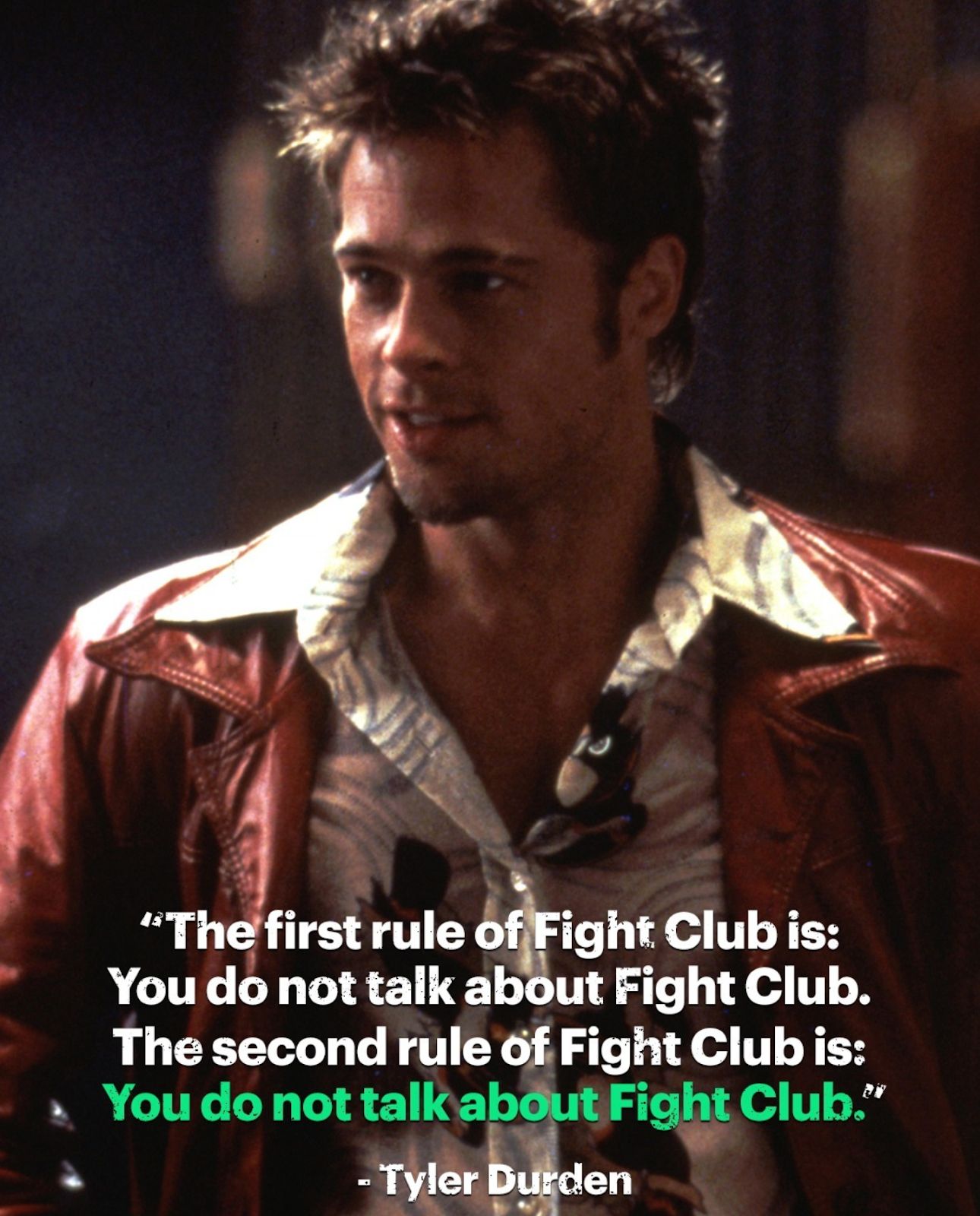
Terry Boyle could be the Tyler Durden of circularity, reorienting its value proposition to transform the system.
Today, Trove powers resale for over 75% of U.S. fashion and apparel brands offering take-back programs: Levi’s, Brooks, On, Arc’teryx. Canada Goose, Michael Kors, Steve Madden, and many others.
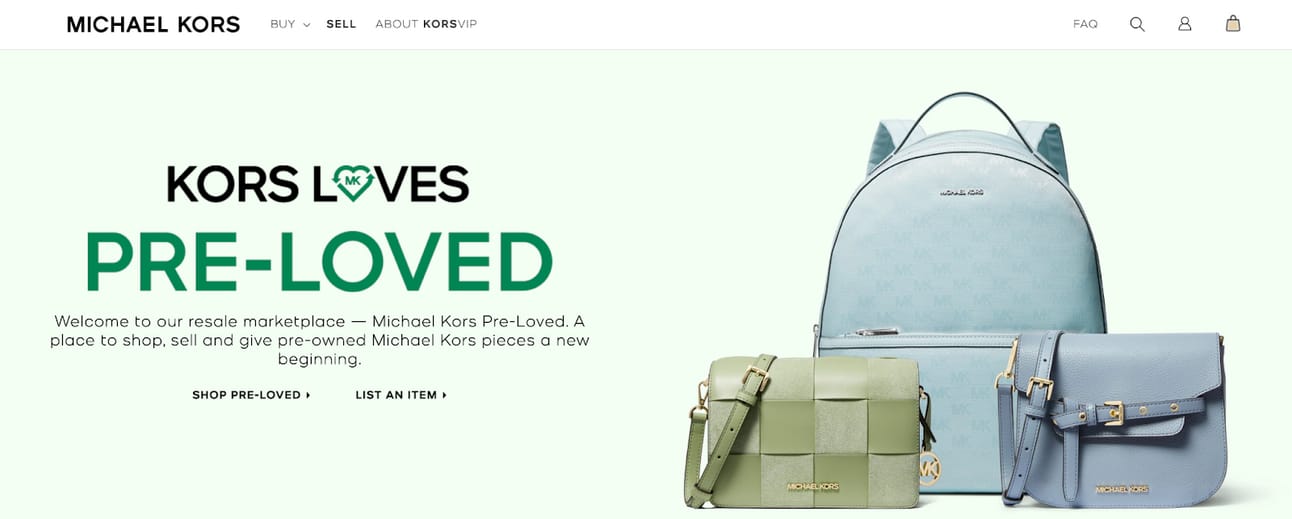
Trove seamlessly powers resale for multi-billion-dollar brands like Michael Kors.
Under Terry’s leadership, Trove aims to become the most significant e-commerce player no one’s ever heard of, seamlessly operating on the backend to deliver world-class resale experiences on the front end.
From Warehouse Operator to Circular Infrastructure Platform
In the early days, Trove operated its own warehouses:
Processing trade-ins
Grading and repairing items
Fulfilling resale orders
That proved the model and gained traction with early sustainability leaders like Patagonia and Eileen Fisher, but didn’t allow for enterprise growth.
Owning physical facilities slowed expansion, crimped working capital, and limited how fast Trove could serve brands with diverse product lines, supply chains, and global ambitions.
Since joining in 2024, Terry has led Trove’s transformation into a software-first platform.
Its Reverse Warehouse Management System (reWMS) enables brands to process returns quickly, assess condition, price dynamically, and resell through every channel.
One platform. Multiple use cases. Designed to scale with brands wherever they want to go.
“We used to ask, ‘Where should we build the warehouse?’” Terry says. “Now we ask, ‘Where do you want to run the program?’ We can be there.”
Consumers Already Love Resale, Brands Elevate It
In 2024, secondhand shopping for apparel approached $50 billion in the U.S.
Marketplaces like Poshmark, The RealReal, and ThredUp thrive because of price, variety, the thrill of finding that perfect piece at a fraction of the original price, and growing concerns about the planet. According to ThredUp’s 2025 resale report, 58% of consumers now shop for secondhand apparel.
By bringing resale into their branded shopping environments, brands elevate the experience.
As Terry puts it:
“The consumer would prefer to buy a resale item from the brand that’s essentially certifying it and condition grading it. They’ll pay more for that. We’ve seen this in other parts of the economy. You go to a car dealership and buy a certified pre-owned car, and you pay more because you know they’ve looked at it and told you what kind of condition it’s in.”
Trust sets branded resale apart.
Personally, I see it every time I shop online at Patagonia. Many of their best sellers—jackets, fleeces, packs—have been staples for years. Today, you can find used versions, listed right alongside new inventory. Same trusted brand. Better price. Quality guaranteed.
It feels a little like cheating—in the best way.
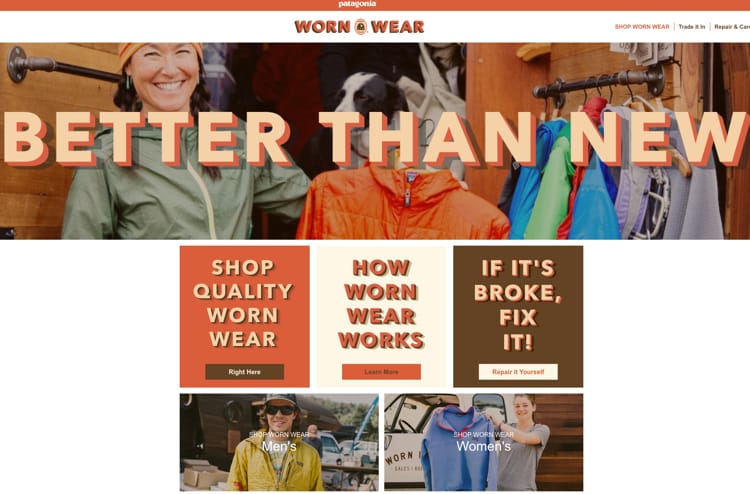
Patagonia’s Worn Wear program has been operational for over a decade.
Why Brands Adopt: The Recommerce Business Case
Trove’s value proposition is straightforward: resale drives profits.
For CFOs, resale beats liquidation. Trade-ins sell at higher margins than bulk offloads.
For CMOs, resale attracts new customers: 50–80% of buyers are new to the brand.
For COOs, Trove reduces labor costs and streamlines returns.
For e-commerce teams, resale becomes a core revenue stream
Canada Goose is a prime example. It’s a luxury brand with no interest in discounting its way into resale. So Trove built them a program that protects pricing, guarantees product quality, and pulls in new customers, without cannibalizing new product sales.
Canada Goose is even exploring guaranteed trade-in value at the point of sale. Buy a jacket today, know its resale value tomorrow.
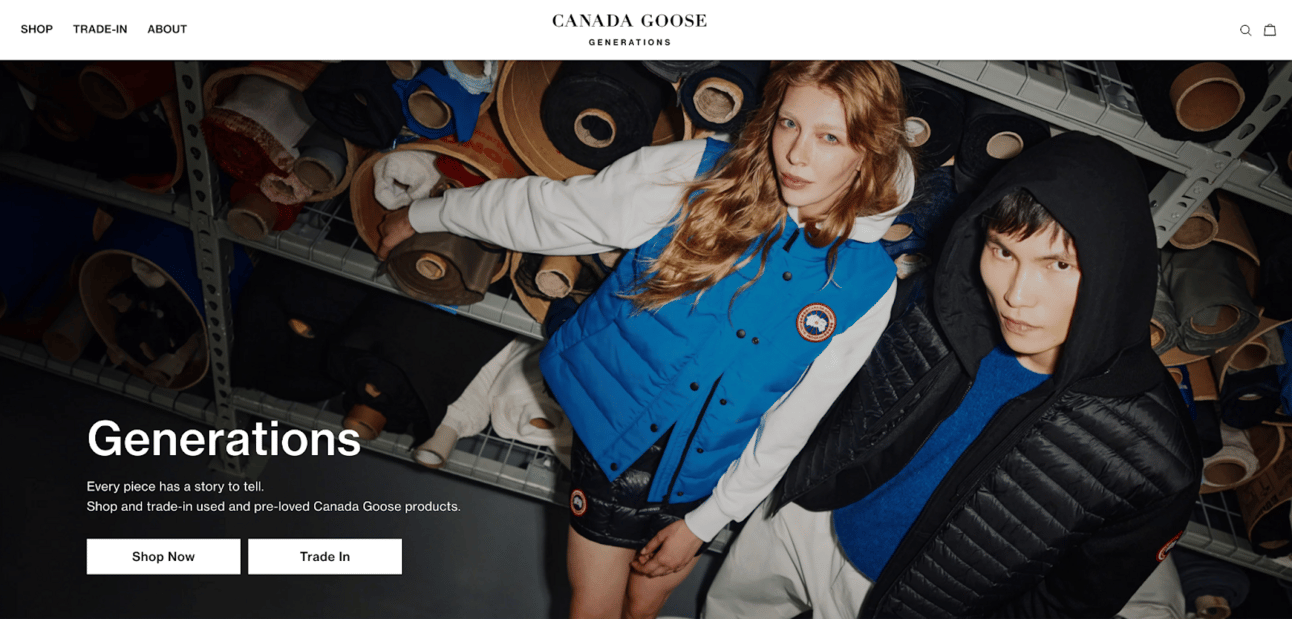
Canada Goose brands its resale program as Generations.
“Once resale programs are running and delivering business results, that’s when brands love to talk about circularity,” Terry says. “It’s just not what gets the deal done.”
That’s not to say that the carbon impact isn’t real. Many of Trove’s clients tout the environmental and climate benefits.
Here’s how Levi’s talks about it on the company’s SecondHand shop:
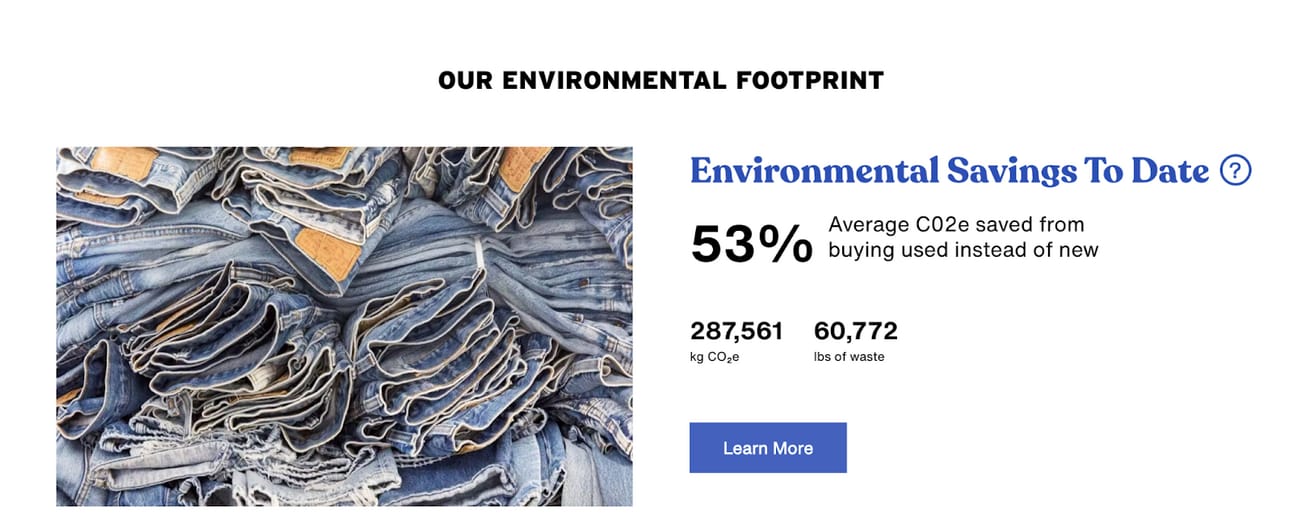
When Tariffs Appear, Resale Thrives
With tariffs rising and supply chains in flux, brands are under pressure.
“Tariffs create uncertainty. And businesses hate uncertainty. Resale gives brands control,” Terry says.
Resale delivers immediate advantages:
✅ Inventory is already in-country—no tariffs, no delays.
✅ Pricing stays steady, even as overseas production costs climb.
✅ Brands can quickly scale resale up or down to meet market demand.
“You can’t change your global supply chain overnight,” Terry adds. “But you can stand up a resale program and start capturing value right now.”
In this environment, resale is more than sustainability. It’s a margin lever. A supply chain hedge. A strategic advantage.
Global Expansion Driven by Circularity Mandates
In Europe, circularity is becoming enforceable law.
Extended Producer Responsibility (EPR): Brands must take responsibility for the end-of-life of their products through reuse, recycling, or proper disposal.
Right to Repair: Companies must offer spare parts, repair information, and services, giving consumers more options to extend product life.
Bans on destroying unsold goods: In 2026, companies will be banned from destroying unsold apparel, clothing, and footwear products.
“Europe is creating conditions where brands have to take more responsibility for their environmental P&L,” Terry says. “In that world, our toolkit makes a lot of sense.”
Trove is well-positioned for the shift. Two recent acquisitions have expanded capabilities and operational footprint: Recurate in North America and Reverse Supply in Europe.
“We have clients who start in the U.S., then want to be in four or five countries,” Terry says. “Every one of them wants something slightly different. That’s the value—we can support all of it.”
Resale Replaces the Old Off-Price Model
For decades, off-price retail was the standard outlet for excess inventory. But most of that inventory wasn’t “unsold.” It was made specifically for off-price retailers like T.J. Maxx.
“When I was at Nordstromrack.com, 80% of what we sold was made for that channel,” Terry says. “It wasn’t unsold inventory. Resale can replace that. You’re not making new product. You’re recapturing value from what you’ve already produced.”
That’s a safer, smarter margin play—another way Trove upgrades business-as-usual.
Ultimately, resale changes how brands think about production, pricing, and customer relationships.
So far, Trove has kept over 6 million items in circulation in partnership with its customers, recapturing value, reducing demand for virgin materials, and cutting emissions.
Supercool Takeaway
Trove is building the infrastructure that brands need to succeed in a circular economy by delivering on the metrics that matter:
✅ Higher margins
✅ New customers
✅ Operational efficiency
✅ Supply chain control
✅ Measurable climate impact
“We’re not the hard part of being environmentally friendly as a company,” Terry says. “We’re the easy part. Because we actually make money.”
For brands, resale is no longer optional. It’s a competitive advantage. For Trove, it’s a scalable business. For the low-carbon economy, it’s essential infrastructure.
And for the future of retail, it’s the next evolution.
Listen to this podcast episode on Apple, Spotify, YouTube, and all other platforms.

↓
This Week’s Supercool Sponsor

The Garbage Bag Gets an Upgrade.
You’ll take out the trash more than 8,000 times in your life. Might as well make it count and look good, too. Rubbish makes compostable, non-toxic, PFAS-free garbage bags with a sense of humor. (Yes, there’s a new saying on every bag.) They remind you when you’re almost out, donate 10% of their bags to charity, and design for the circular economy.
↓
Quote of the Week:
“Canada Goose Generations is our purpose in action – a tangible and meaningful way to keep the planet cold and the people on it warm. We build products that last a lifetime, and each one has a story to tell. Generations extends their collective tale while minimizing their environmental impact.”
Carrie Baker, President of Canada Goose
Stat of the Week: $367 Billion

The global secondhand resale market for apparel is expected to reach $367 billion by 2029, growing 2.7x faster than the overall apparel market, according to ThredUp.
↓
Circular Solutions That Scale
In recent editions, we’ve spotlighted companies building circular infrastructure for the low-carbon economy across events, mobility, and critical materials.
r.World is transforming how live events manage reuse at scale, from stadiums and concert venues to iconic festivals like Coachella. Their platform keeps billions of single-use items out of landfills while delivering a seamless fan experience. (newsletter / podcast)
Upway is building global recommerce infrastructure for e-bikes. What started in France is expanding across Europe and the U.S., making high-quality e-bikes more accessible while keeping valuable products in circulation. (newsletter / podcast)
Cyclic Materials is reshaping supply chains by recycling rare earth magnets—recapturing critical minerals once considered unrecoverable, and reducing pressure on virgin mining. (newsletter / podcast)
All three companies are scaling up-market, driving circularity as a business advantage.
Climate Solutions Trending Across Fashion and Apparel
Here’s what else we’re tracking.

Circ and Zara’s recycled fabrics were once polycotton blends in other garments.
Circ Recycles Blended Fabrics
Switching to recycled materials can reduce carbon emissions by up to 80%. But polycotton blends—one of the most common fabrics in fashion—have been notoriously difficult to recycle. Circ has spent 15 years working on the challenge of separating polyester from cotton. Today, brands like Zara use Circ’s recycled fibers—made from polycotton blends recovered from old garments—in their apparel collections. Its parent company, Inditex, joined Circ’s recent $25 million Series B funding round.

Outerknown’s Kelsun™ Universal Blanket Shirt.
Keel Labs Turns Seaweed into Soft Fibers
Keel Labs uses seaweed to create Kelsun, a renewable, biodegradable fiber that replaces petroleum-based synthetics. Unlike fossil-fuel-derived materials, Kelsun requires minimal freshwater, land, and chemical inputs. Outerknown, the sustainable fashion brand founded by surfer Kelly Slater, is among the first to integrate Keel Labs’ seaweed-based textiles in its products.
A Dedicated Fashion Climate Fund
The Apparel Impact Institute identifies, funds, scales, and measures proven climate solutions. Its Fashion Climate Fund is targeting $250 million, with support from H&M Group, Lululemon, PVH (parent of Calvin Klein and Tommy Hilfiger), and others. The focus: investments in energy efficiency, renewable power, next-gen materials, and manufacturing upgrades across the global supply chain. The goal is to catalyze $2 billion in blended finance to drive industry-wide decarbonization.
↓
Not yet subscribed to Supercool?
Click the button below for weekly updates on real-world climate solutions that cut carbon, boost the bottom line, and improve modern life.
🌐
